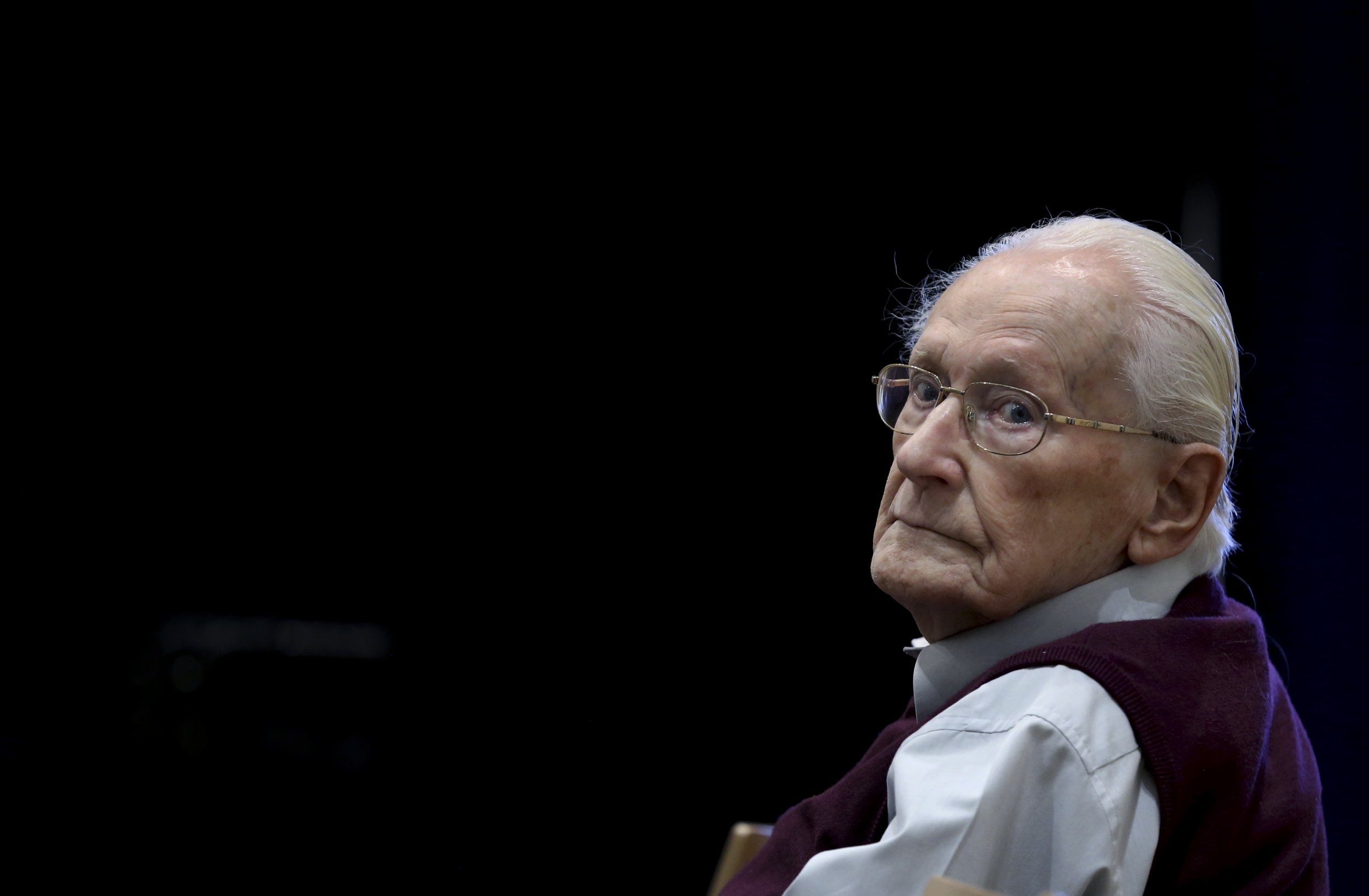
Oskar Groening, who served as a guard at Auschwitz during World War II, addressed survivors and families of Holocaust victims in a statement at his trial in Germany on Wednesday, expressing his "humility and guilt" for his role in the atrocities committed at the camp.
The former guard was stationed at one of the Nazi regime's largest concentration camp complexes for almost two years and faces charges of 300,000 counts of accessory to murder. Now 94 years old, he addressed a court in the northern German town of Lueneburg via a statement read by one of his lawyers.
Groening had previously said he was morally guilty, and he conceded Wednesday that he bore "shared guilt for the Holocaust, although my part was small," Agence France Presse reported. He maintained, however, that while he was aware of deaths at the camp, he had never killed anyone personally and had made repeated requests to be transferred.
"I've consciously not asked for forgiveness for my guilt," he said in his statement, The Guardian reported. "Regarding the scale of what took place in Auschwitz and the crimes committed elsewhere, as far as I'm concerned I'm not entitled to such a request. I can only ask the Lord God for forgiveness."
Groening worked at the infamous concentration camp—which has remained a symbol of the Nazis' extermination of Jews and members of other groups during the Holocaust—from October 1942 until September 1944. Often described as "the accountant of Auschwitz" or "the bookkeeper of Auschwitz," he sorted money taken from the victims and occasionally served on "ramp duty," overseeing belongings piled on the selection ramp upon the arrival of a transport. Groening was charged in September with a set of accessory to murder counts that corresponds to the number of Hungarian Jews transported to Auschwitz and gassed upon arrival in the spring of 1944, during his time there. His trial began in April and is tentatively due to end in late July.
Groening, who has heard testimony from Auschwitz survivors during the course of the trial, said in his statement Wednesday that "the events of Auschwitz, the mass murders, were known to me. But many of the details that have been told here were not known to me."
"What happened in Auschwitz has been brought before my eyes once again," Groening added. "The suffering of the deportees in the trains, the selection process and the subsequent extermination of the majority of the people has been brought home to me again in the clearest possible way…as well as the terrible living conditions of those who were not murdered immediately."
Groening has stood out amongst other ex-guards with his choice to speak openly about his time at Auschwitz, saying he decided to do so in part to counter those who deny the Holocaust ever happened. "I saw the gas chambers. I saw the crematoria," he said in the TV documentary series Auschwitz: The Nazis and the Final Solution by Laurence Rees. "I would like you to believe that these atrocities happened, because I was there."
Between 1940 and 1945, at least 1.3 million people (including more than a million Jews) were deported to the Auschwitz concentration camp complex (which included Auschwitz-Birkenau and Auschwitz-Monowitz), according to the United States Holocaust Memorial Museum. Of those deported to the camp, approximately 1.1 million perished.
Germany brought Groening to trial only after a legal precedent was set with the 2011 conviction of John Demjanjuk. Demjanjuk was charged with 28,060 counts of accessory to murder and found guilty for working as a guard at the Sobibór extermination camp (in present-day Poland) without necessarily proving he was involved in specific killings. In September 2013, Germany's Baden-Württemberg state justice ministry in Ludwigsburg recommended a list of 30 former Auschwitz guards, including Groening, who were still alive and in Germany at the time and should be prosecuted.
One woman who was deported with her family to Auschwitz-Birkenau spoke in court Wednesday after Groening's lawyer read the statement. Irene Fogel Weiss was 13 when she arrived at the camp in May 1944 and lost much of her family there, including her parents and four siblings.
"He has said that he does not consider himself a perpetrator but merely a small cog in the machine," said Weiss, who immigrated to New York in 1947 and later settled in Virginia with her husband. But "to that 13-year-old, any person who wore that uniform in that place represented terror and the depths to which humanity can sink, regardless of what function they performed. And today, at the age of 84, I still feel the same way."
Uncommon Knowledge
Newsweek is committed to challenging conventional wisdom and finding connections in the search for common ground.
Newsweek is committed to challenging conventional wisdom and finding connections in the search for common ground.
About the writer
Stav is a general assignment staff writer for Newsweek. She received the Newswomen's Club of New York's 2016 Martha Coman Front ... Read more
To read how Newsweek uses AI as a newsroom tool, Click here.








